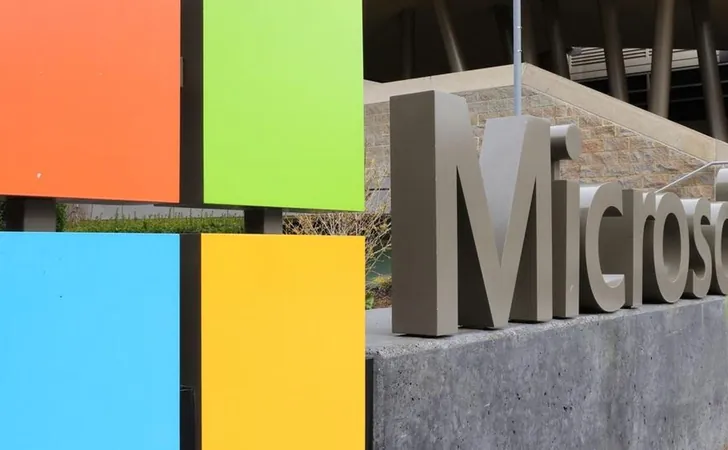
Scientists Fear Trump Administration's War on mRNA Technology Could Sabotage Future Medical Breakthroughs
2025-03-27
Author: Benjamin
Introduction
In a startling turn of events, scientists are expressing growing alarm over the Trump administration's seemingly hostile stance toward mRNA technology—a revolutionary platform instrumental in the rapid development of COVID-19 vaccines and hailed for potential breakthroughs in treating a range of diseases, including cancers and infectious infections. The initiative, which could significantly enhance the healthcare landscape, is being treated with skepticism, as misinformation and conspiracy theories about vaccines proliferate.
Concerns Over Funding Cuts
Experts interviewed by The Guardian have raised red flags about a recent initiative by the National Institutes of Health (NIH) to compile data on funding for mRNA-related research. This move has led to fears that the administration may target funding cuts or defund critical grants connected to mRNA technology, which has become synonymous with pandemic response.
The urgency of this research is underscored by its application not only in COVID-19 but also in trials for combating diseases like bird flu, dengue, and various types of cancer.
Scientific Community's Response
While NIH has not issued any formal announcements regarding funding cuts to mRNA research, informal communications within the scientific community suggest grave concerns: researchers are reportedly discouraged from applying for mRNA grants, fearing repercussions if they apply or speak out. One scientist from New York noted, "Colleagues have been advised not to apply for mRNA vaccine grants... This is all through the grapevine."
Concerns Over Contract Scrutiny
Adding to the unease are uncertainties surrounding a recently scrutinized $600 million contract between the Department of Health and Human Services (HHS) and Moderna. This funding was vital for research on mRNA vaccines designed to counter five different flu subtypes, including the dangerous H5N1 strain.
Political Appointments and Public Perception
The ongoing public health narrative has been complicated by recent appointments to key positions within the administration, notably those of Robert F. Kennedy Jr. as health secretary, who has a history of criticizing mRNA vaccines, and Dr. Jay Bhattacharya, an influential figure known for his controversial views on COVID-19 response measures. Their influence raises concerns over the perceived "demonization" of mRNA technology and mounting skepticism about the safety and efficacy of vaccines established during the pandemic.
Broader Trends of Politicization
Many experts believe this turmoil reflects a broader trend of politicization surrounding the pandemic and related medical research. Dorit Rubinstein Reiss, a vaccine law expert, states that prior to the pandemic, even anti-vaccine groups did not target mRNA technology. This shift underscores the influence misinformation has had on public opinion, shaping policies that could have lasting repercussions on scientific progress.
Public Health Achievements
Despite the turbulence, current mRNA vaccine data illustrates stark public health achievements. Studies have demonstrated that COVID-19 vaccines have saved over 3 million American lives and prevented more than 18 million hospitalizations.
Potential Ramifications
Nevertheless, the political narrative surrounding these vaccines continues to undermine support for mRNA-related research. Experts express deep concerns about the potential ramifications for the future of mRNA research and its funding, stressing that any attempt to eliminate this technology could hinder vital advancements in treating diseases and responding to future pandemics.
A former NIH employee pointed out the significant risks of derailing such critical research pathways, declaring, "It is economic madness and a nightmare for the future of medical science."
Conclusion
As Trump remains a polarizing figure within the healthcare dialogue, experts are closely watching how these developments influence the approval process conducted by the FDA, particularly concerning mRNA vaccines. The future landscape of mRNA research hangs in the balance, emphasizing the need for transparency and sound scientific evaluation free from political influence.
In this precarious climate, scientists and public health advocates continue to hope for a resolution that supports and nurtures the incredible potential of mRNA technology in saving lives and advancing healthcare innovation.









 Brasil (PT)
Brasil (PT)
 Canada (EN)
Canada (EN)
 Chile (ES)
Chile (ES)
 Česko (CS)
Česko (CS)
 대한민국 (KO)
대한민국 (KO)
 España (ES)
España (ES)
 France (FR)
France (FR)
 Hong Kong (EN)
Hong Kong (EN)
 Italia (IT)
Italia (IT)
 日本 (JA)
日本 (JA)
 Magyarország (HU)
Magyarország (HU)
 Norge (NO)
Norge (NO)
 Polska (PL)
Polska (PL)
 Schweiz (DE)
Schweiz (DE)
 Singapore (EN)
Singapore (EN)
 Sverige (SV)
Sverige (SV)
 Suomi (FI)
Suomi (FI)
 Türkiye (TR)
Türkiye (TR)
 الإمارات العربية المتحدة (AR)
الإمارات العربية المتحدة (AR)